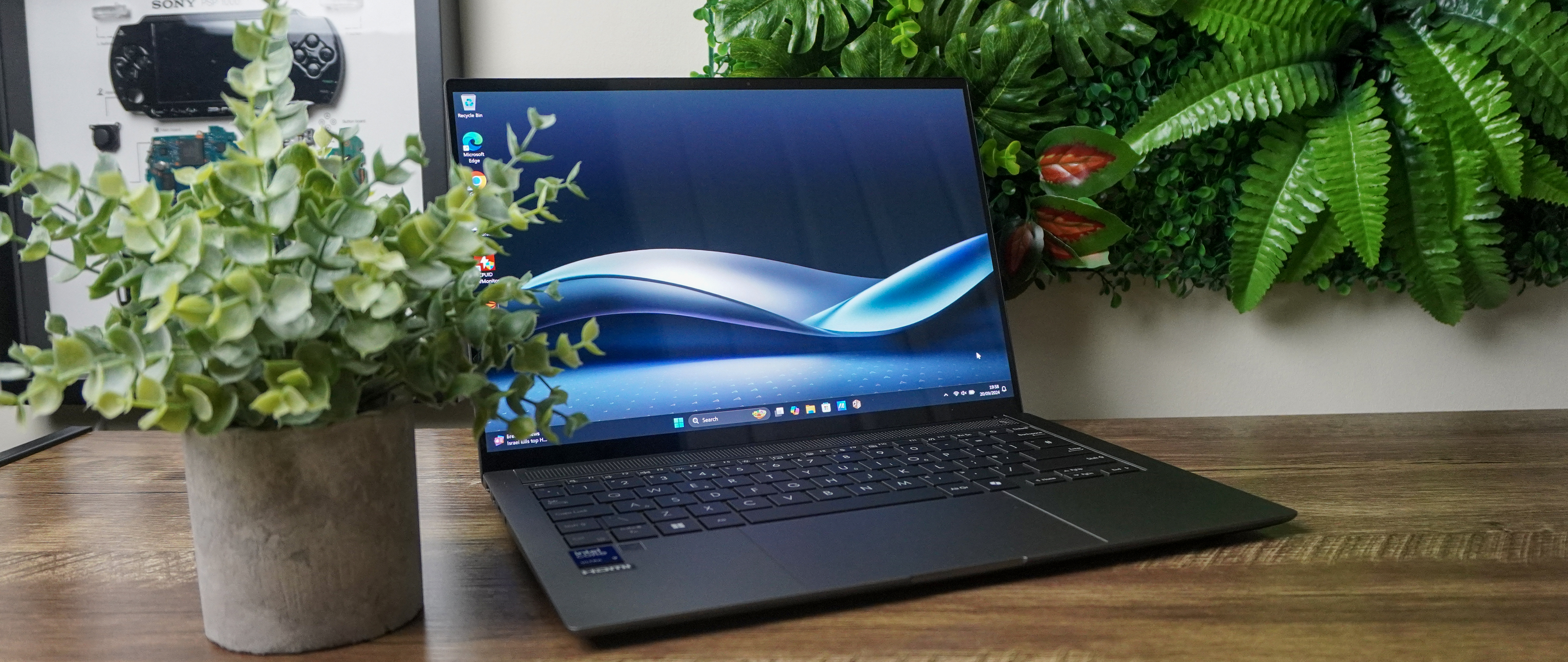Tom's Guide Verdict
For all intents and purposes, the Asus Zenbook S 14 is a good laptop with a gorgeous design, mouthwatering OLED panel and top notch ergonomics. But Intel is the problem here — Lunar Lake is heading in the right direction in terms of battery life, but in a Snapdragon X Elite world, it falls just shy.
Pros
- +
A gorgeous, refined design
- +
OLED so colorful you can taste it
- +
Stellar ergonomics
- +
Intel has nailed graphics
- +
Impressive battery life
Cons
- -
But general performance falls behind
- -
Limited port array
- -
Pricey for what you get
Why you can trust Tom's Guide
Intel Core Ultra 200 series (codename Lunar Lake) is here, and Asus has joined the party with the Zenbook S 14. The chip wars are beginning to heat up, so does team blue show up to the party? Sort of.
Asus has given this a helluva college try — a thin and light notebook with a drop dead gorgeous design and impressive ergonomics, which sit just below an eye-meltingly good OLED panel. The port array may be a little restricted, but you get just enough to get stuff done.
This is where the Intel part of the equation comes into play. Core Ultra 200 series has made some impressive gains in a couple of areas where it matters. The battery life is much better than last year, and out of all the new chipsets, the graphical performance here takes the lead in the Windows laptop space.
But in general performance, Intel falls behind the likes of AMD and Qualcomm, and while stamina gains are to be applauded, we’ve still seen longer in Arm-based computers over the traditional x86 path that Intel takes.
Sure, you get some benefits here in terms of not worrying about that ARM app compatibility, and the integrated graphics performance does mean you can get away with playing some AAA games at respectable frame rates. But for the $1,499 price you pay for this, you can get more where it matters in overall speed and stamina.
Asus Zenbook S 14: Cheat Sheet
- What is it? This is a notebook sporting the latest Intel Lunar Lake chipsets
- Who is it for? This is for those who need something thin and light for getting stuff done on-the-go, without the limitations of a heavier system
- What does it cost? You can pick it up for $1,499 from Asus
- What do we like? Asus has been on an absolute roll when it comes to laptop design, and this is no different. This laptop is damn sexy with a sleek shell, great ergonomics and a tasty OLED display. On top of that, Intel has done well in improving battery life and graphics performance
- What don’t we like? We are in a different era of the chip wars now, and in general performance, Intel is at the back of the pack.
Asus Zenbook S 14: Specs
| Price | $1,499 |
| CPU | Intel Core Ultra 7 258V |
| RAM | 32GB LPDDR5 |
| Storage | 1TB SSD |
| Display | 14-inch 3K (2880 x 1800) OLED, 16:10, 120Hz refresh rate |
| Ports | 2x Thunderbolt 4, 1x USB 3.2 Gen 2 Type-A, HDMI 2.1, 1x 3.5mm audio jack |
| Battery | 72 WHrs |
| Wireless connectivity | Wi-Fi 7, Bluetooth 5.4 |
| Dimensions | 12.2 x 8.5 x 0.5 inches |
| Weight | 2.7 pounds |
Asus Zenbook S 14: The ups
Asus has really found its stride in laptop design, and that is all on show here in the Zenbook S 14. On top of that, there are some strengths to Intel’s Lunar Lake.
Another Asus, another stellar OLED panel
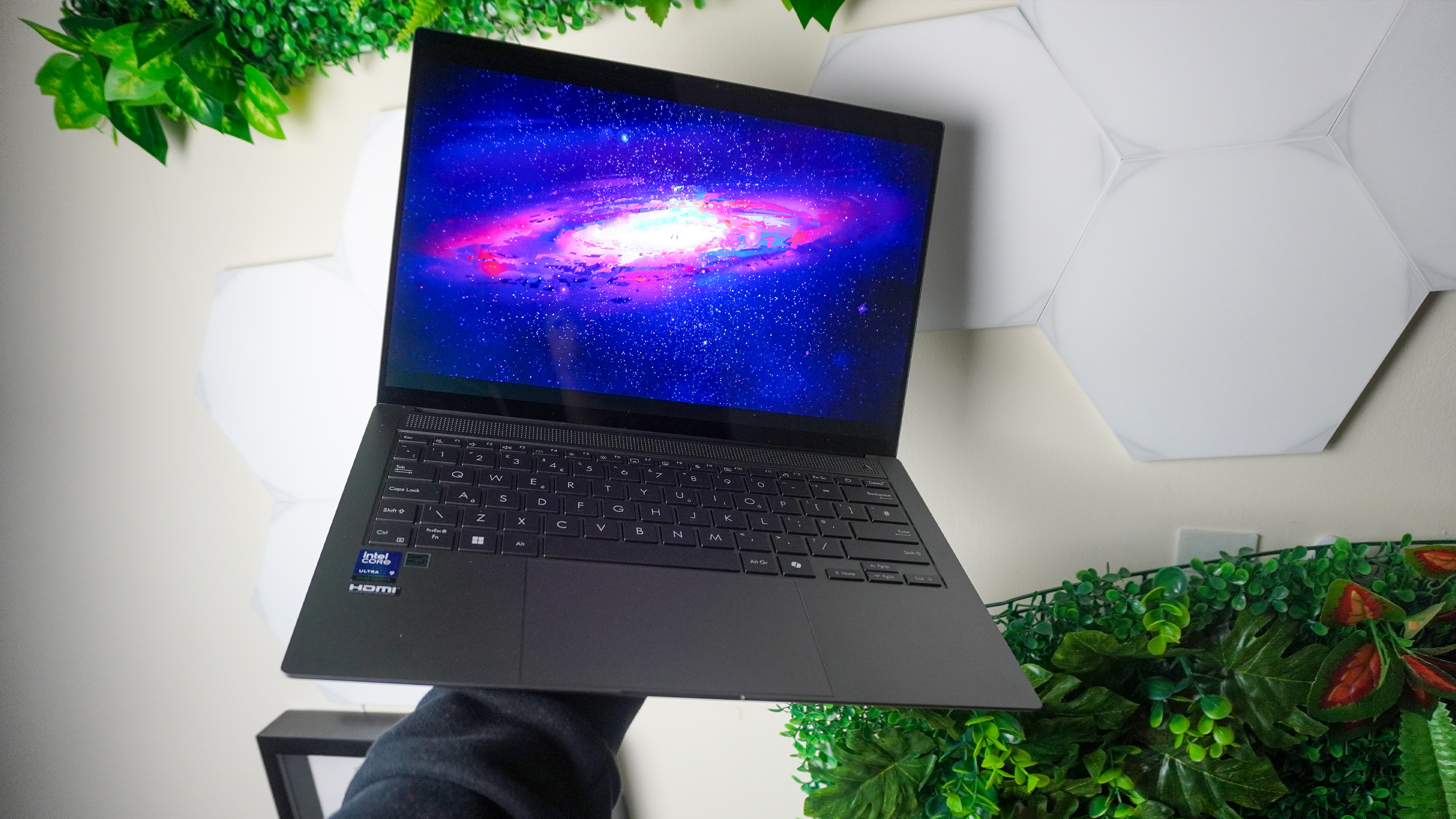
By this point, I’m sure you’ve heard it all before when it comes to Asus leaning in hard on OLED displays across its entire laptop range. That is very much the case here — a flash flood of color with a crispy resolution, deep contrast, buttery smooth 120Hz refresh rate, and an impressively zippy touch response rate.
Get instant access to breaking news, the hottest reviews, great deals and helpful tips.
| Laptop | Average brightness (nits) | DCI-P3 color gamut (%) |
|---|---|---|
| Asus Zenbook S 14 (Intel) | 342 | 82 |
| Asus Zenbook S 16 (AMD) | 357.2 | 79.7 |
| Dell XPS 13 (Snapdragon) | 455.8 | 66.8 |
| M3 MacBook Air | 476.4 | 77.8 |
That average brightness means you’ll want to keep away from direct sunlight to see the screen (something we’re seeing in a lot of OLED displays that aren’t tandem OLED like the M4 iPad Pro). But all-in-all, this is a stunner.
Real attention to detail
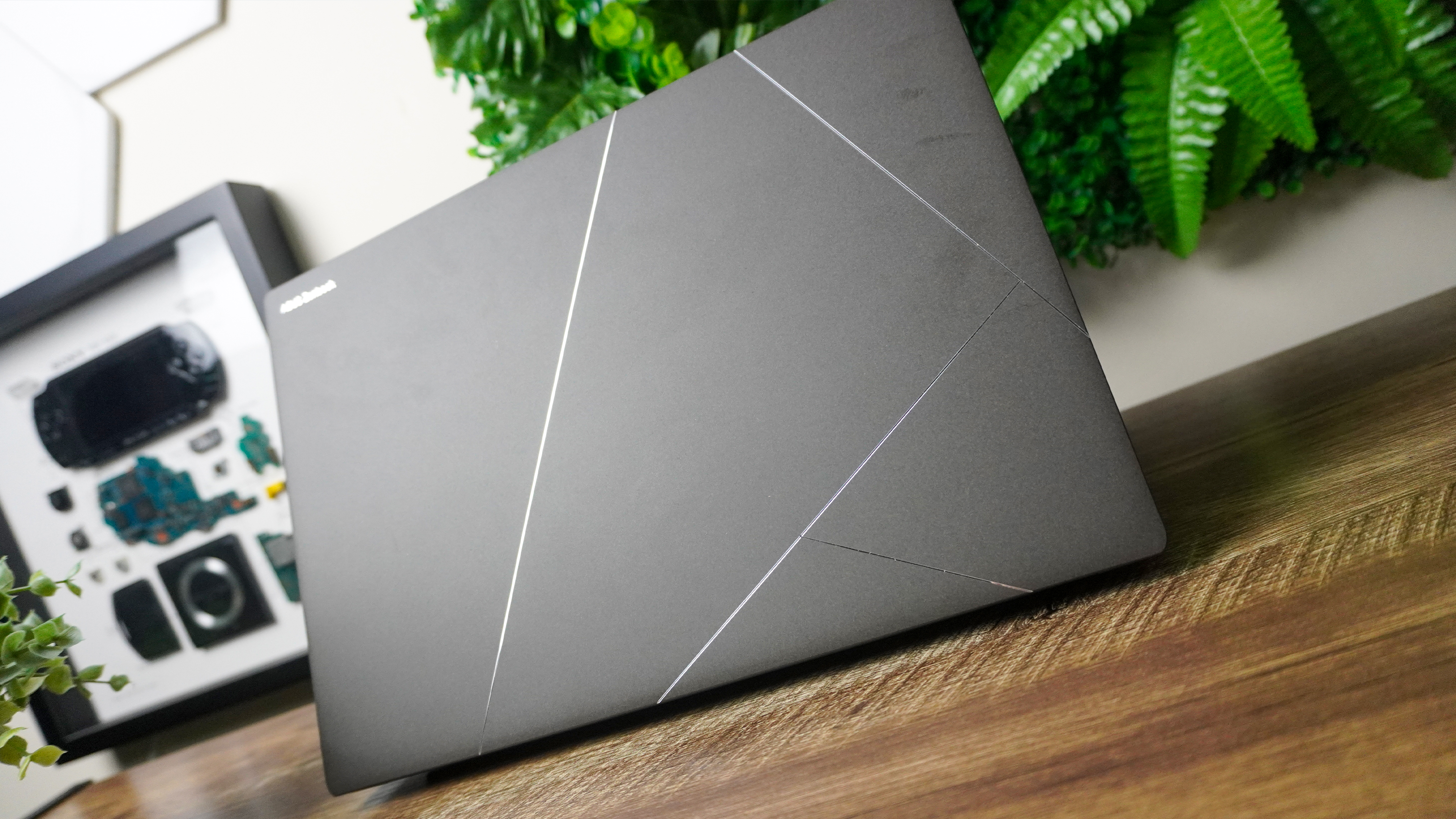
For the past 12-18 months, Asus has been making some of the best-looking and best-feeling laptops I’ve used, and that’s the same case with the Zenbook S 14. That ceraluminum finish with the sharp, angular lines across the lid exude a premium, utilitarian nature out of every pore. And gracing your fingers upon this surface reveals an almost paper-like texture that feels satisfyingly durable.
| Laptop | Dimensions | Weight |
|---|---|---|
| Asus Zenbook S 14 | 12.2 x 8.5 x 0.5 inches | 2.7 pounds |
| Dell XPS 13 | 11.6 x 7.8 x 0.6 inches | 2.6 pounds |
| M3 MacBook Air | 12 x 8.5 x 0.4 inches | 2.7 pounds |
Oh, and did we mention this thing is rather small and lightweight? Asus has done something special here with this frame, and on top of that, the ergonomics are supreme too. The keyboard feels great to type on with plenty of depth, and the touchpad has a nice slick texture to it with a satisfyingly tactile click — alongside the side gestures you see in the Zenbook S 16.
Intel is finally getting somewhere with battery life and graphics
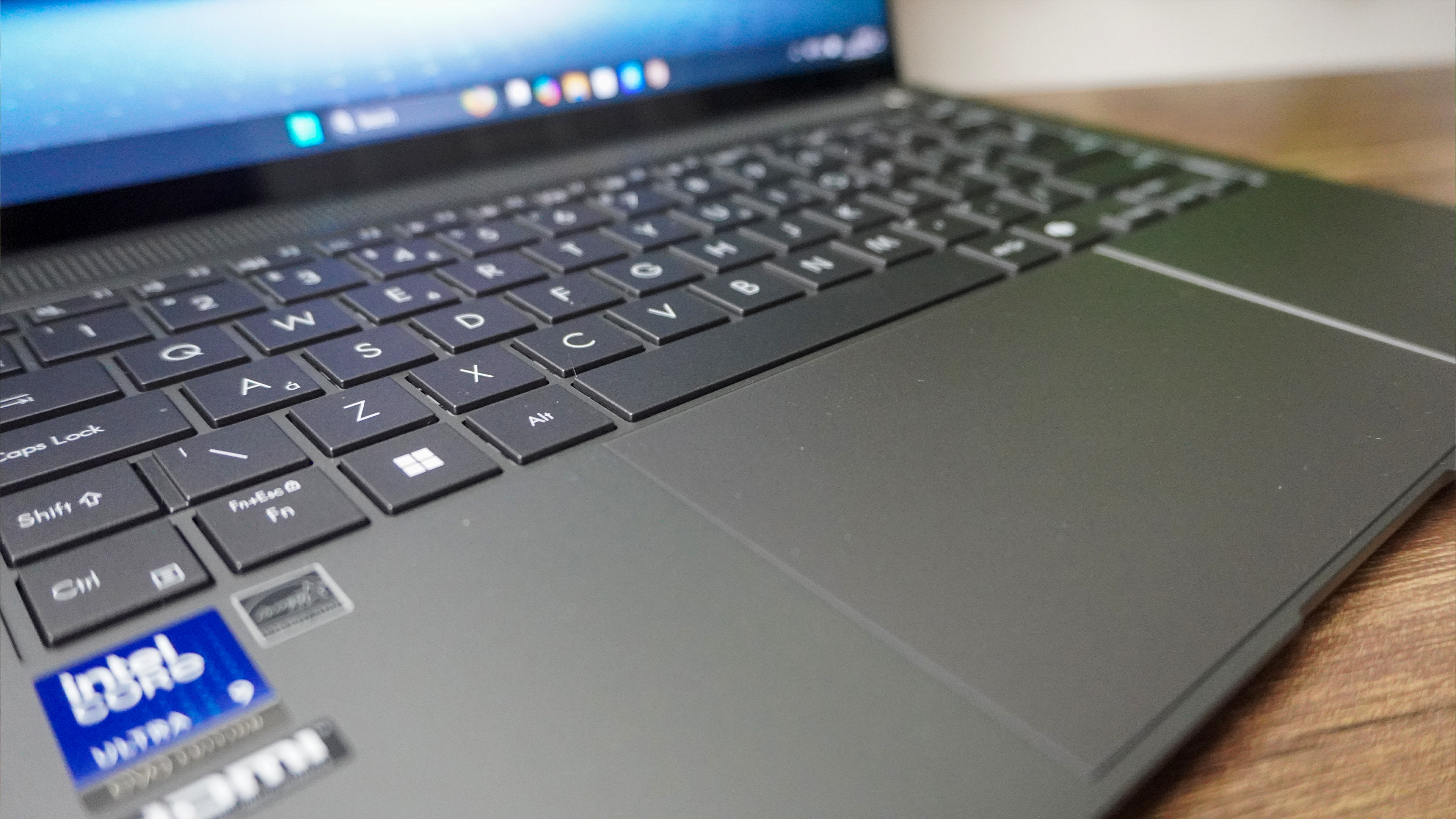
With Lunar Lake, Intel has had a major rethink of its laptop CPUs — removing hyperthreading (a speedy way of doing tasks but not the most power efficient) and putting the system’s RAM directly on the chip are probably the biggest standout features of them all.
These work together to give you a vastly improved battery life for an Intel laptop. The numbers here show Intel has taken a big step forward. Lasting just over 13 hours in the Tom's Guide Battery test (web surfing and streaming video at 150 nits of screen brightness) Zenbook S 14 may not be up to the likes of the Snapdragon X Elite-armed systems, but it comes closer. The Dell XPS 13 with Snapdragon endured for over 19 hours.
| Laptop | Battery Rundown Test (hh:mm) |
|---|---|
| Asus Zenbook S 14 (Intel) | 13:08 |
| Asus Zenbook S 16 (AMD) | 11:35 |
| Dell XPS 13 (Snapdragon) | 19:26 |
| M3 MacBook Air | 15:03 |
Also, a particular shout-out to the battery drain when the lid is closed — something that has plagued x86 laptops in the past, but Intel has completely eliminated. In the three times I tested it (charging to 100% and closing the lid for 12 hours), the sleep mode must be doing something extra special here to preserve every single percent of that longevity.
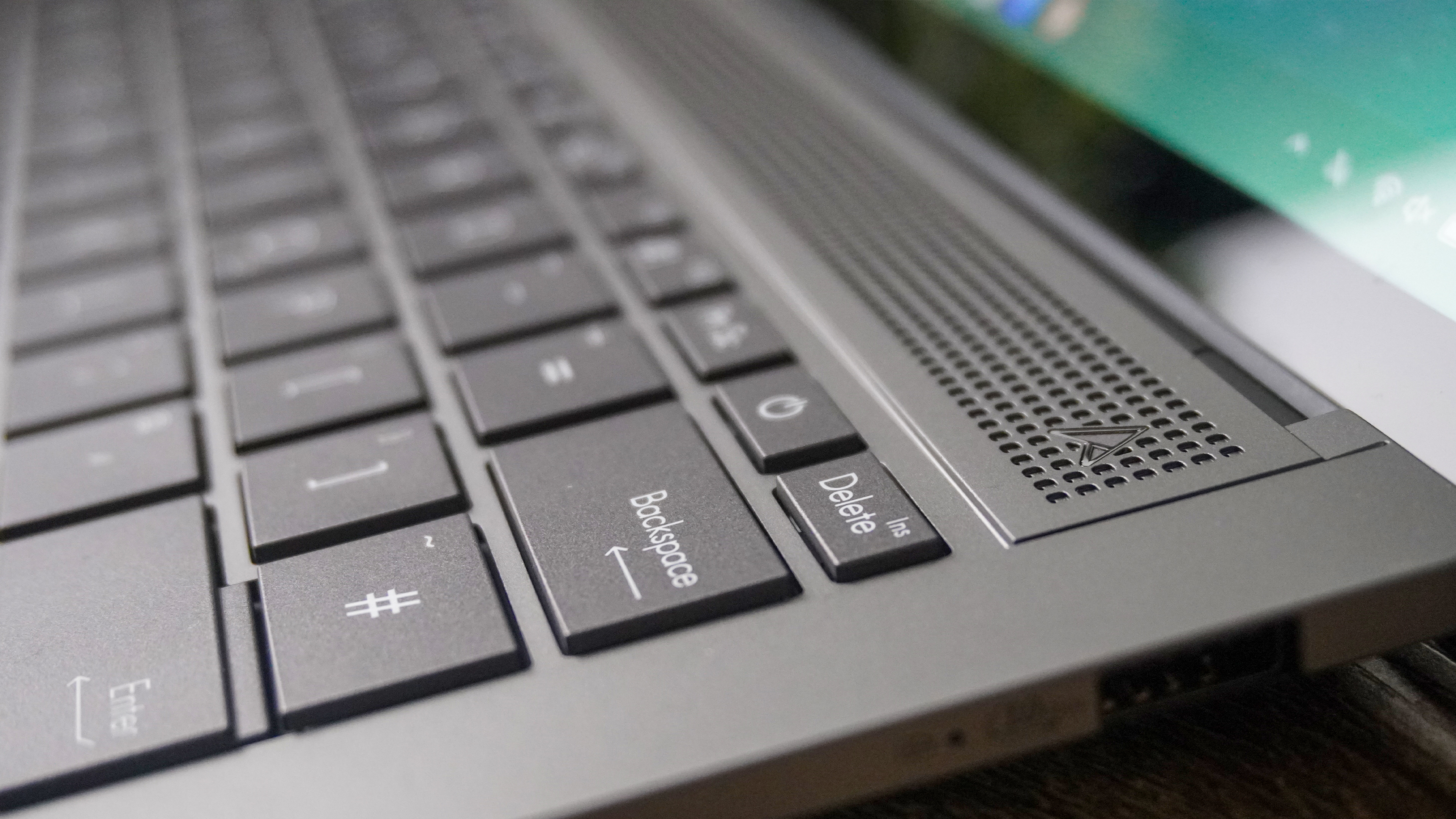
Elsewhere, Intel has seen just how important a strong GPU is for AI workloads — that much has been clear given the true strength of the Asus ProArt P16 as one of the best AI laptops you can buy.
So with that in mind, Intel Core Ultra 200 series sports up to a claimed 1.5x better graphics performance thanks to the 2nd generation graphical cores and improved ray tracing capabilities. In fact, Intel has gone in so hard on this that the company has made sacrifices elsewhere for it (more on that later).
| Benchmark | Asus Zenbook S 14 (Core Ultra 7 258V) | Asus Zenbook S 16 (Ryzen AI 9) | Dell XPS 13 (Snapdragon X Elite) |
|---|---|---|---|
| Geekbench AI GPU test (Quantized score VINO/GPU) | 26901 | n/a | 22182 |
| 3DMark Fire Strike | 7806 | 7486 | 5635 |
| Civ 6 | 48.1 FPS | 63.2 FPS | 22.5 FPS |
Yes the Ryzen AI 9 has better frame rates, but to get this, the amount of power AMD sucked from the battery was significantly higher. We’ll get into the bad about Intel real soon, but there’s plenty of good to write home about too.
Asus Zenbook S 14: The downs
So far so good…so what’s the problem here? Well, outside of a couple small gripes, there is only one real problem. And it’s a big one if you want to get the best bang for your buck in a small and light notebook.
Intel’s at the back of the pack
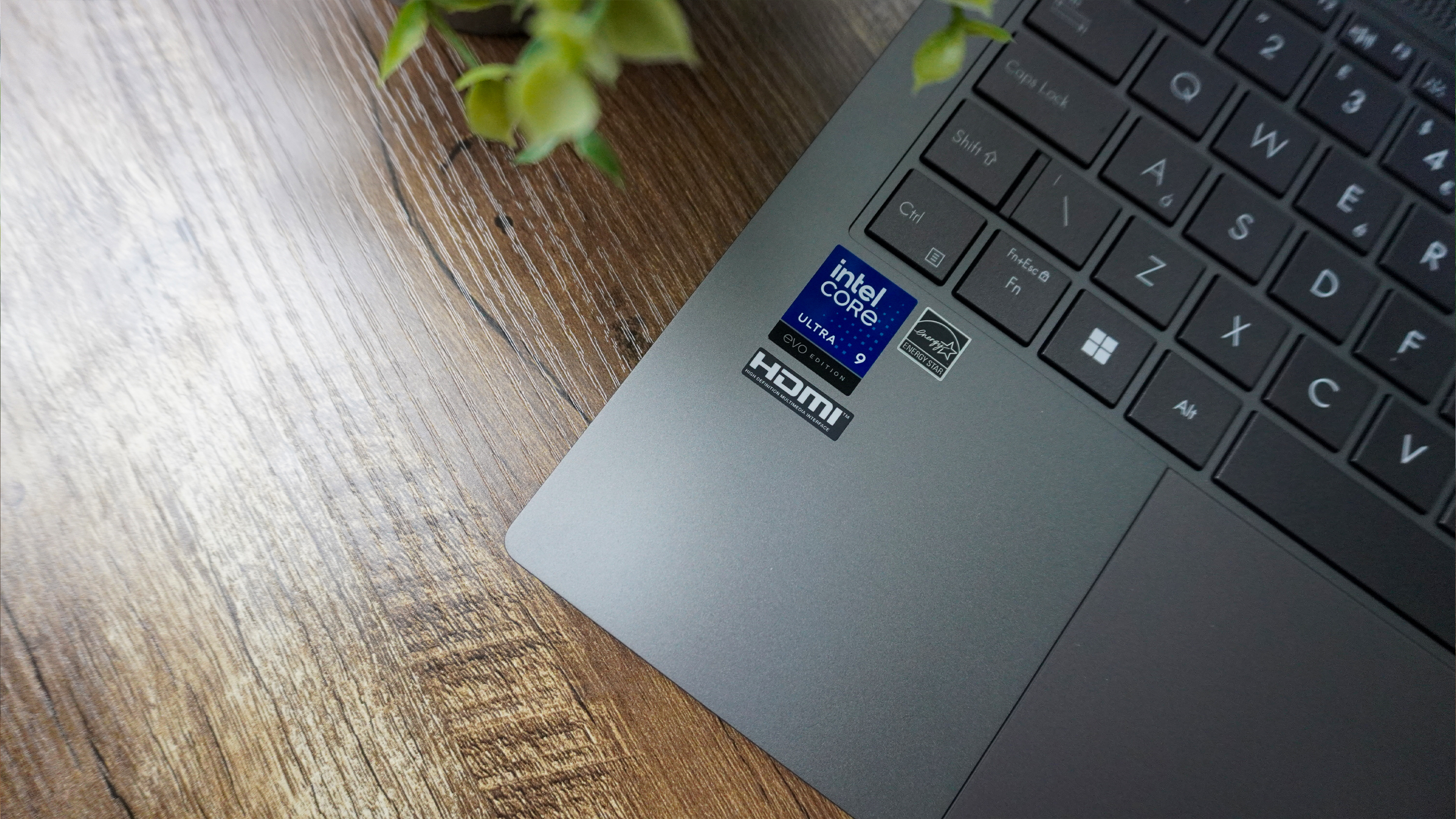
So while Intel has backed up its claims in the graphics and battery life department (the latter one thanks to that improved NPU), general performance hasn’t seen the same gains. So in the day-to-day, you won’t really notice the differences.
| Benchmark | Asus Zenbook S 14 (Core Ultra 7 258V) | Asus Zenbook S 16 (Ryzen AI 9) | Dell XPS 13 (Snapdragon X Elite) | M3 MacBook Air |
|---|---|---|---|---|
| Geekbench 6.3 single-core | 2751 | 2765 | 2797 | 3093 |
| Geekbench 6.3 multicore | 11157 | 13282 | 14635 | 12025 |
| Pugetbench Photoshop | 6897 | 7249 | 6150 | 8550 |
| Handbrake (transcode 4K video into 1080p in mm:ss) | 8:30 | 5:09 | 4:41 | 6:34 |
| BlackMagic Disk Speed test (Write speed in MBps) | 2513.5 | 2977.5 | 3128.6 | n/a |
If you look at the results, the Lunar Lake-powered Asus Zenbook S 14 falls behind the competition on several tests. This includes Geekbench (single core and mulit-core), as well as our video transoding test. In fact, this system is nearly 4 minutes slower than the Snapdragon XPS 13 and over 3 minutes slower than the AMD-powered Zenbook S 16. At least the Lunar Lake system delivers better Photoshop scores than the Snapdragon laptop.
Most interestingly is the fact that while our crack testing lab got the version with Intel Core Ultra 7 258V, I also received the model with the top-of-the-range Core Ultra 9 288V. Now as far as I can see, this version is available only in the UK for £1,749 (sorry about that). For context, that’s £150 more than the Core Ultra 7 configuration, so do you get any additional bang for your buck? Well…kind of, but it's debatable.
| Laptop | Geekbench 6.3 single-core | Geekbench 6.3 multicore | 3DMark Fire Strike |
|---|---|---|---|
| Asus Zenbook S 14 (Core Ultra 7 258V) | 2751 | 11157 | 7806 |
| Asus Zenbook S 14 (Core Ultra 9 288V) | 2853 | 11125 | 8227 |
So let’s go ahead and put this into context. Not only are the gains by going for the more expensive chipset here still barely negligible, but the base line Snapdragon X Plus in the ProArt PZ13 is still faster than this. At the prices being asked for of laptops packing these flagship chips, that’s just not good enough.
I won’t ignore the obvious here — Intel is heading in the right direction. That improvement in battery life needs to be applauded, and there’s no doubt that in the integrated graphics face-off between the big Windows 3, team blue has a clear lead here.
But where it matters — being a notebook for getting stuff done as quickly as possible — Intel is seemingly taking baby steps. It’s simply impossible to ignore the fact that Snapdragon X chips are faster with better battery life, and AMD just about matches the stamina here while coming with better single and multi-threaded speeds.
Just a couple of other things
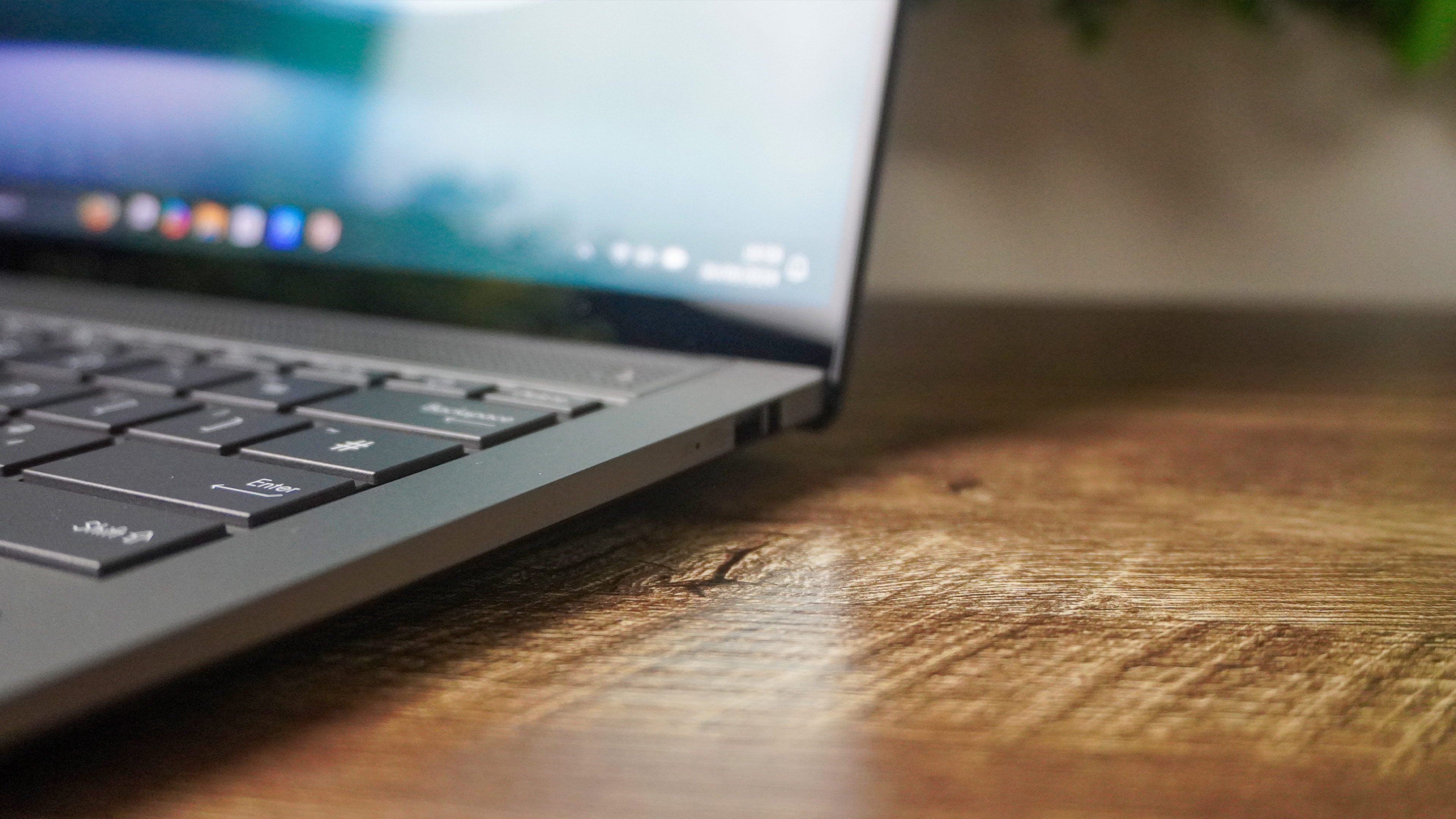
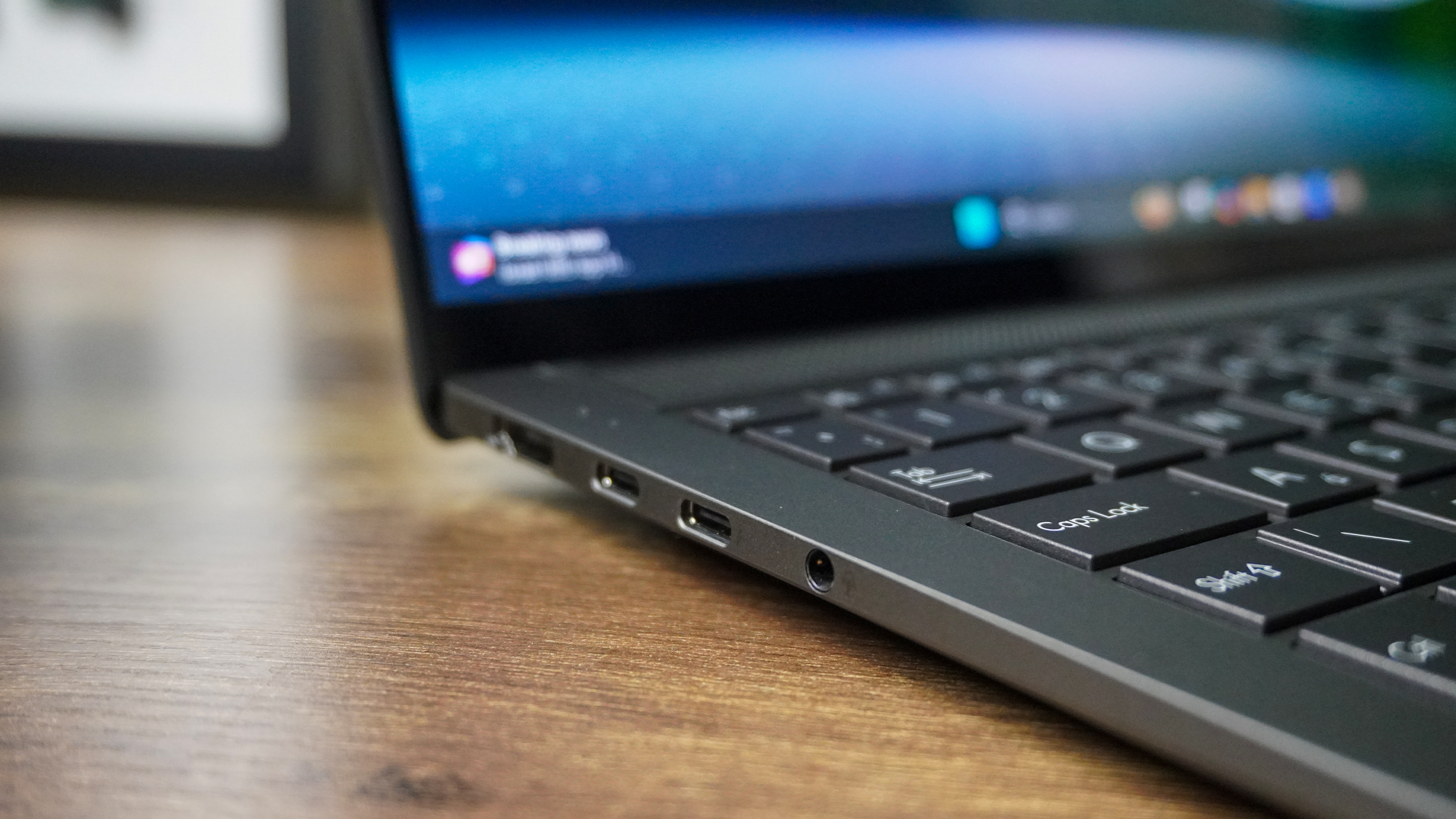
These aren’t necessarily dealbreakers, but just some small annoyances that may impact your purchasing decision, so I’m grouping them into one con.
- Port array is limited: It’s nice to get two Thunderbolt 4 ports so you can make the most of a good docking station, but it would’ve been nice to see an SD card slot on here to maximize productivity.
- It’s a big of a smudge magnet: Look, I love the ceraluminum finish. But smudges of fingerprints do show up very easily on it.
Asus Zenbook S 14: Verdict
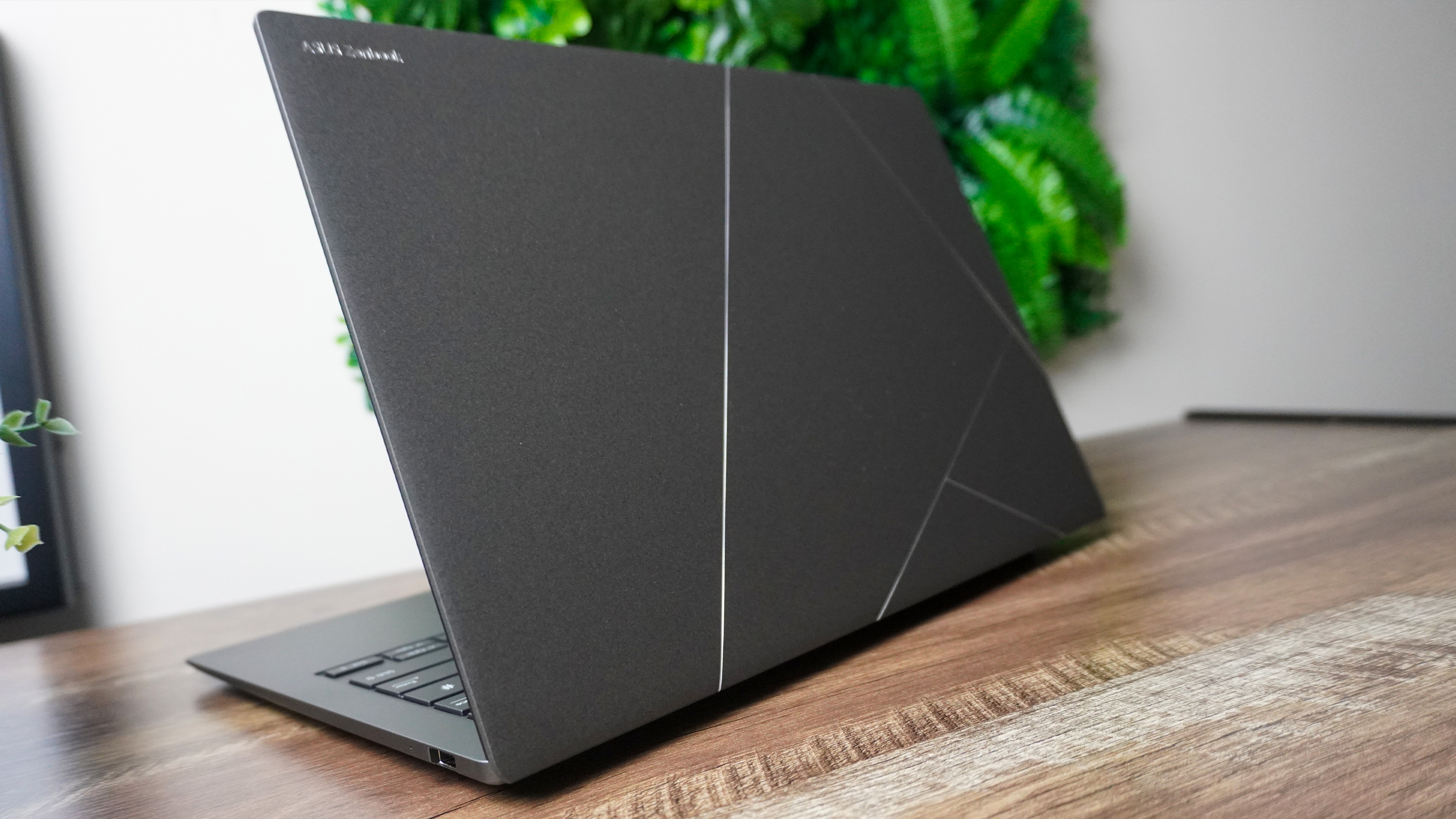
So I’m left feeling conflicted about the Asus Zenbook S 14. It’s a good laptop that looks great, has a lovely OLED display and a top tier keyboard/touchpad combo. But you can get better.
In a world where Qualcomm didn’t just show up with the Snapdragon X Elite and bring unprecedented performance gains that even show Apple up, this score would be higher. That’s not to say Intel doesn’t outperform the X Elite here in certain areas — graphics have had a serious tune-up and x86 means you won’t face any of the app compatibility issues.
But for the all-round performance, while this does keep up, you can get more bang for your buck elsewhere.

Jason brings a decade of tech and gaming journalism experience to his role as a Managing Editor of Computing at Tom's Guide. He has previously written for Laptop Mag, Tom's Hardware, Kotaku, Stuff and BBC Science Focus. In his spare time, you'll find Jason looking for good dogs to pet or thinking about eating pizza if he isn't already.
